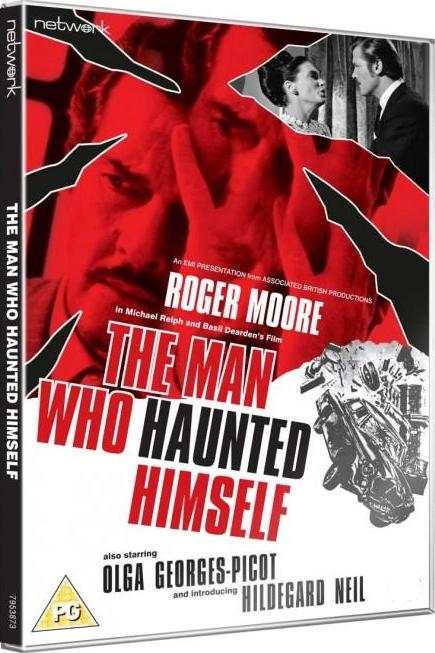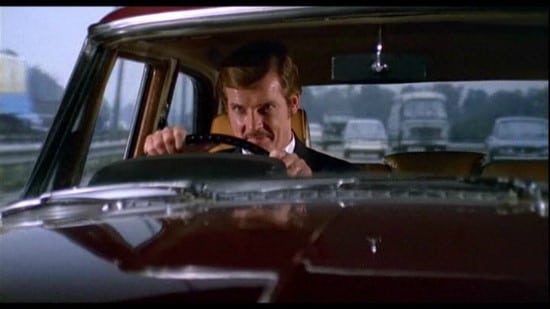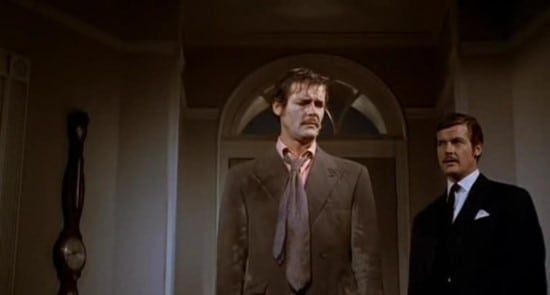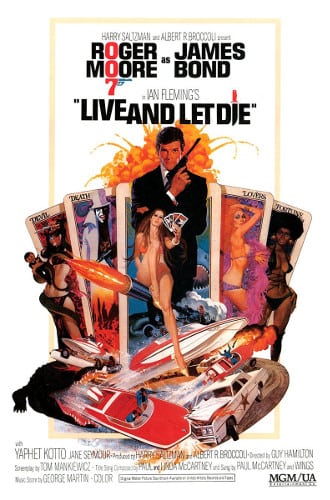The Man Who Haunted Himself (1970)
Directed by: Basil Dearden
Written by: Anthony Armstrong, Basil Dearden, Michael Ralph
Starring: Alastair MacKenzie, Hildegard Neil, Olga Georges-Picot, Roger Moore
HCF REWIND NO 136: THE MAN WHO HAUNTED HIMSELF [1970]
AVAILABLE ON DVD AND BLU-RAY: Now
RUNNING TIME: 85 min
REVIEWED BY: Dr Lenera, Official HCF Critic

While driving one evening, uptight city worker Harold Pelham becomes possessed and crashes his car. On the operating table, he briefly suffers clinical death, after which there appear to be two heartbeats on the monitor. When he awakes, Pelham’s life begins to be turned upside-down. In his job as a director of a marine technology company he learns that he now supports a merger that he once opposed, he is apparently having an affair, and friends, colleagues and acquaintances claim to have seen him in places where he has never been. Does Pelham have a doppelgänger- or is he actually going insane?
Sorry Craig, Dalton, Brosnan and Lazenby, Roger Moore will always be my second favourite James Bond; no, he may not be as good an actor as most of those, especially Craig and Dalton, but I grew up with his [and Connery’s] 007 films and to me he epitomises the screen Bond [not, I have to add, the book Bond; Dalton and Craig are far closer]. For a while last year, it didn’t seem like you could move for seeing Moore on TV appearing on TV programmes and on stage, and I had the pleasure of seeing the great man live. He often mentioned a certain film called The Man Who Haunted Himself [in fact once he told the entire plot and I just mentally switched off for a couple of minutes] with great fondness and said the lead role[s] was his favourite part and his best performance. Of course I wanted to see the film greatly after this.
Well I can tell you that I understand why Moore thinks of the role the way he does. It stretches him as an actor more than any part he played before or after, giving him the opportunity to reveal nuances both subtle and unsubtle, and Moore responds by acting his socks off and doing the part justice. Though there is the odd little known exception like his very decent stab at Sherlock Holmes [albeit in a poor film], for the most part Moore just seems to play variants on his roles as The Saint and 007. I caught a film of his on TV a few months I’d never seen called Shout At The Devil, a rather good Africa-set adventure set during WW1, and there Moore was again doing his usual stuff, virtually playing Bond in the jungle. However, The Man Who Haunted Himself really reveals him to be a strong actor who most certainly could do different kinds of roles. I guess that he was just typecast for most of his movie career after and became content giving audiences what they expected of him.
This film was based on a short story called The Case Of Mr Pelham which had already been made as an episode of the Alfred Hitchcock Presents TV series. There’s something very scary about the idea of someone learning that they have a double or doppelganger. When I was young and first explored the dark genius of Edgar Allan Poe, his story William Wilson frightened the hell out of me. Similarly, there was a certain episode of The Hammer House Of Horror TV series featuring a doppelganger that is still renowned for scaring viewers senseless. Surprisingly, The Man Who Haunted Himself didn’t cause much interest when it came out, despite having two stills from the film, one showing Harold Pelham reaching across for his seat-belt and the other showing a close-up of his hand fastening the seat-belt buckle, used a part of a road safety campaign to persuade people always to wear their seat belts. It did begin to become a cult favourite eventually though, and some of that was because of a far more morbid reason than it having Moore superbly playing a serious part. Basil Dearden, the director, not a filmmaker talked much about nowadays but with classics of British cinema like The Blue Lamp and Victim on his long list of credits, died shortly after completing filming. He died in a car crash in a place that was in the exact same location that a major character dies in the film.
The Man Who Haunted Himself can be classified as a horror film, so don’t be put off by the ‘PG’ certificate. It’s more frightening in terms of its concept than what we see occur on screen, but it does get very tense. It opens, after a very Ennio Morrione-sounding-like music theme from Michael J. Lewis, with a very quickly edited car crash which made me wonder for a few seconds if I was watching a film from now rather than 1970, than proceeds at a slower pace as Harold Pelham starts to hear that he has been places and done things that he hasn’t, and come to the conclusion that he has a physical double. He’s a rigid businessman who always drives carefully, always wears the same tie, doesn’t want to make love to his wife, and doesn’t even like to gamble! How un-Bond-like is that? He does, though, at one point say: “Espionage isn’t all James Bond and Her Majesty’s Secret Service”. Yep, this is the first time you hear Moore saying two particular words on screen. And actually, Pelham’s double, until the end seen only briefly and usually in short flashbacks, is rather like Bond in his confident, smarmy way [it reminded me of my favourite performance by him as 007, The Man With The Golden Gun]. I think I speak for many men when I say that Bond is a guy who we want to be, so it’s also interesting that Pelham’s double seems to represent the man he perhaps secretly yearns to be.
The emphasis though is on the duller Pelham as his life starts to unravel. Moore is really impressive and makes his plight very believable in a basically fantastical tale which doesn’t even bother to explain itself. Freddie Jones, with an Irish accent but looking like Dr. Strangelove, turns up for a few scenes as a psychiatrist to talk babble, but we end up none the wiser. Though it really takes its time to build up a head of steam and sometimes holds back from the more interesting possibilities of the concept, the film does become more and more gripping and climaxes in a stunningly shot car chase where Moore is bathed in lights of various colours. It’s like something out of a Mario Bava film, though I guess some modern viewers are used to lengthier, more elaborate climaxes. Then there’s a very clever ending where you really have to be watching very carefully to notice what has happened. Like much of the film, it’s quite low-key. Except for one shot where one Pelham circles round the other, a shot which doesn’t look perfect but is still very impressive and must been incredibly difficult to achieve in 1970, the minimal special effects are simple but do the job.
Hildegard Neil and Olga Georges-Picit add eye candy for the male viewer as the two women in both of the Pelham’s lives and are good in the parts too. Parts of The Man Who Haunted Himself are a little clumsy and it would really have benefitted from some more detail in places, but it is still a very worthwhile endeavour, a solid thriller with a macabre twist, while it goes without saying that it’s a film which every Moore fan should have in their collection. It also seems to be making the very brave but sensible point that in order to be a better person, you may need to have both ‘good’ and ‘bad’ sides.
Rating: 









Network’s DVD and Blu-Ray includes:
* DVD of new HD transfer of main feature in as-exhibited theatrical aspect ratio
* Full Frame 4:3, as-filmed version of main feature
* feature commentary
* original theatrical trailer
* music-only audio
* image gallery
* promotional material gallery
* promotional material PDFs
[] DVD of new HD transfer of main feature in as-exhibited theatrical aspect ratio
[] Full Frame 4:3, as-filmed version of main feature
[] feature commentary
[] original theatrical trailer
[] music-only audio
[] image gallery
[] promotional material gallery
[] promotional material PDFs – See more at: https://networkonair.com/features/2013/02/07/the-man-who-haunted-himself-bddvd/#sthash.ZPE3t7NO.dpuf







Be the first to comment